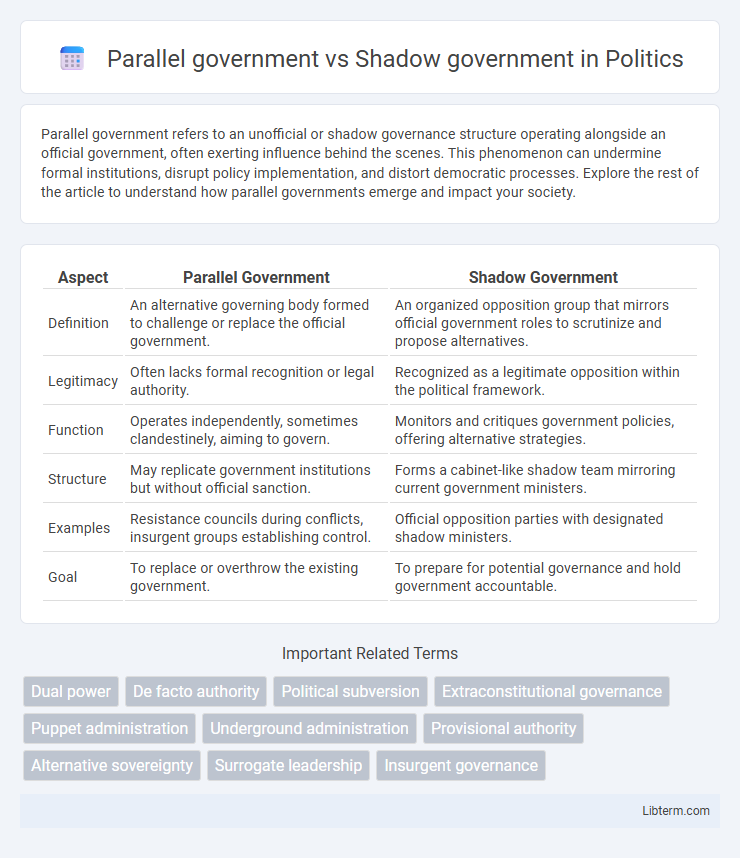Parallel government refers to an unofficial or shadow governance structure operating alongside an official government, often exerting influence behind the scenes. This phenomenon can undermine formal institutions, disrupt policy implementation, and distort democratic processes. Explore the rest of the article to understand how parallel governments emerge and impact your society.
Table of Comparison
| Aspect | Parallel Government | Shadow Government |
|---|---|---|
| Definition | An alternative governing body formed to challenge or replace the official government. | An organized opposition group that mirrors official government roles to scrutinize and propose alternatives. |
| Legitimacy | Often lacks formal recognition or legal authority. | Recognized as a legitimate opposition within the political framework. |
| Function | Operates independently, sometimes clandestinely, aiming to govern. | Monitors and critiques government policies, offering alternative strategies. |
| Structure | May replicate government institutions but without official sanction. | Forms a cabinet-like shadow team mirroring current government ministers. |
| Examples | Resistance councils during conflicts, insurgent groups establishing control. | Official opposition parties with designated shadow ministers. |
| Goal | To replace or overthrow the existing government. | To prepare for potential governance and hold government accountable. |
Defining Parallel Government: Concepts and Origins
Parallel government refers to an unofficial administrative structure operating alongside the recognized government, often established by political movements or insurgent groups to challenge existing authority. Originating from historical resistance efforts, such as the Indian independence movement's provincial governments in the 1940s, it functions to provide governance and legitimacy in areas where official state control is weak or contested. Unlike shadow governments, which are covert and oppositional, parallel governments may openly administer services and justice, aiming to replace or undermine the official regime.
Understanding Shadow Government: Meaning and Purpose
Shadow government refers to an unofficial or covert group that operates alongside the legitimate government, often aiming to influence or control political decisions without public accountability. Its purpose is to maintain power behind the scenes, manipulating policies and governance through secretive means to serve specific interests or agendas. Unlike a parallel government, which may openly challenge official authority, a shadow government remains hidden to avoid detection and preserve its influence.
Historical Evolution of Parallel Governments
The historical evolution of parallel governments traces back to colonial and conflict-ridden regions where indigenous or resistance groups established alternative administrative systems to challenge official authority. Notable examples include the Indian independence movement's parallel governance structures in the 1940s and the Viet Cong's shadow administration during the Vietnam War, both embodying grassroots control and legitimacy within contested territories. These entities evolved by embedding local customs and political mobilization to sustain operations alongside or beneath recognized state institutions.
Development and Role of Shadow Governments in Politics
Shadow governments originate as covert or unofficial political organizations operating alongside recognized state authorities, designed to influence or supplant official governance structures. Their development often stems from political crises, revolutionary movements, or diaspora groups seeking legitimacy and control in contested regions. These entities play significant roles in shaping political discourse, mobilizing opposition, and preparing alternative governance frameworks during periods of instability or regime change.
Structural Differences Between Parallel and Shadow Governments
Parallel governments operate with official recognition, maintaining formal institutions and administrative frameworks that mimic or compete with existing state structures. Shadow governments, in contrast, function covertly without legal status, often orchestrating policies and power behind the scenes through informal networks and clandestine operations. Structural differences are evident in the transparency, legitimacy, and organizational hierarchy, with parallel governments exhibiting visible bureaucracies while shadow governments rely on secrecy and indirect influence.
Functions and Objectives: Parallel vs Shadow Governments
Parallel governments operate openly within existing legal frameworks, mirroring official state institutions to provide alternative governance and services, aiming to offer legitimacy and support to specific political or social groups. Shadow governments function covertly, often undermining official authorities by orchestrating clandestine activities to seize power or influence policy without formal recognition. The primary objective of parallel governments is to compete in the political arena through structured administration, whereas shadow governments focus on subversion and control behind the scenes.
Global Examples: Parallel Government in Action
The concept of parallel government manifests in various global contexts, such as the Syrian National Coalition operating alongside Bashar al-Assad's regime, providing an organized opposition with its own governance structures and international recognition. In Venezuela, the opposition-led National Assembly functions as a parallel government to Nicolas Maduro's administration, asserting legitimacy and gaining support from multiple countries. These examples highlight how parallel governments operate to challenge existing authorities, maintain alternative political legitimacy, and influence both domestic and international affairs.
Notable Cases of Shadow Governments Worldwide
Notable cases of shadow governments worldwide include Myanmar's military junta operating behind the civilian government facade and the Taliban's clandestine governance in Afghanistan prior to official recognition. In Venezuela, the parallel power exerted by Nicolas Maduro's regime contrasts with Juan Guaido's interim government claiming legitimacy. These shadow entities undermine official institutions by exercising covert control, shaping national politics without transparent accountability.
Impact on Democracy and Governance
Parallel governments undermine democratic institutions by creating alternative power centers that operate outside constitutional frameworks, weakening accountability and transparency. Shadow governments, often clandestine and unaccountable, distort governance by influencing official policies without public consent, eroding trust in elected officials. Both structures disrupt the balance of power, fostering political instability and diminishing the legitimacy of democratic processes.
Future Trends: Parallel and Shadow Governments in Modern Politics
Future trends in parallel and shadow governments reveal increasing reliance on digital platforms and decentralized networks to influence policy and public opinion. Parallel governments often emerge through legitimized institutions and political factions operating covertly within established systems, while shadow governments leverage misinformation and clandestine operations to shape power dynamics. Advances in artificial intelligence and big data analytics will enhance both entities' capabilities to impact governance, posing challenges for transparency and democratic accountability in modern politics.
Parallel government Infographic

 libterm.com
libterm.com